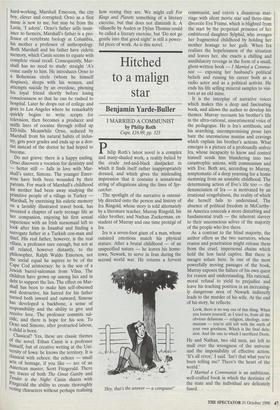Hitched to a malign star
Benjamin Yarde-Buller
I MARRIED A COMMUNIST by Philip Roth Cape, f16.99, pp. 323 Philip Roth's latest novel is a complex and many-shaded work, a reality belied by the crude red-and-black dustjacket in which it finds itself rather inappropriately dressed, and which gives the misleading impression that it contains a sensational string of allegations along the lines of Spy- catcher.
The spotlight of the narrative is ostensi- bly directed onto the person and history of Ira Ringold, whose story is told alternately by a literature teacher, Murray Ringold, his elder brother, and Nathan Zuckerman, ex- student of Murray and one time protégé of Ira.
Ira is a seven-foot giant of a man, whose outsized emotions match his physical stature. After a brutal childhood — of an unspecified nature — he leaves his home- town, Newark, to serve in Iran during the second world war. He returns a fervent Hey, that's the answer — a computer!' communist, and enters a disastrous mar- riage with silent movie star and three-time divorcée Eve Frame, which is blighted from the start by the perpetual presence of her embittered daughter Sylphid, who avenges her fragmented childhood by holding her mother hostage to her guilt. When Ira realises the hopelessness of the situation and leaves her, she exacts a chilling and annihilatory revenge in the form of a small, ghost-written book — I Married a Commu- nist — exposing her husband's political beliefs and ruining his career both as a radio actor and as a political activist. He ends his life selling mineral samples to visi- tors at an old mine.
It is the interplay of narrative voices which makes this a deep and fascinating book, and allows the author to develop his themes. Murray recounts his brother's life in the ultra-rational, unsentimental voice of the pedagogue. He is Ira's antithesis, and his searching, uncompromising prose lays bare the unconscious manias and cravings which explain his brother's actions. What emerges is a picture of a profoundly unfree Ira, whose incapacity to know and control himself sends him blundering into two catastrophic unions, with communism and with Eve. Both are, according to Murray, symptomatic of a deep yearning for a home stemming from an unstable childhood. The determining action of Eve's life too — the denunciation of Ira — is motivated by an irrational vengefulness, the reality of which she herself fails to understand. The absence of political freedom in McCarthy- ist America conceals a more disturbing and fundamental truth — the inherent slavery to their unconscious selves of the majority of the people who live there.
As a contrast to the blind majority, the author offers us the two narrators, whose reason and penetration might release them from the cruel, impersonal chains which hold the less lucid captive. But there is meagre solace here. In one of the most powerfully moving passages of the book, Murray exposes the failure of his own quest for reason and understanding. His rational, moral refusal to yield to prejudice and leave his teaching position in an increasing- ly dangerous area of Newark indirectly leads to the murder of his wife. At the end of his story, he reflects:
Look, there is no way out of this thing. When you loosen yourself, as I tried to, from all the obvious delusions — religion, ideology, com- munism — you're still left with the myth of your own goodness. Which is the final delu- sion. And the one to which I sacrificed Doris.
He and Nathan, two old men, are left to mull over the wrongness of the universe and the impossibility of effective action. `It's all error,' I said. 'Isn't that what you've been telling me? There's the heart of the world.'
I Married a Communist is an ambitious, well-crafted book in which the destinies of the state and the individual are delicately fused.


















































































 Previous page
Previous page